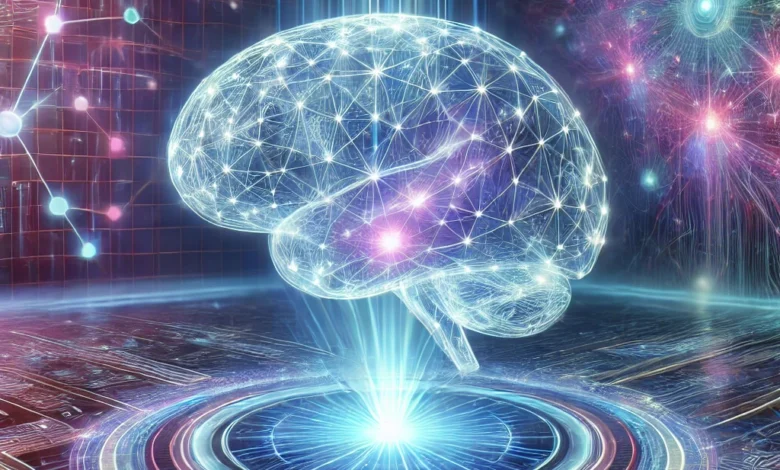The Future of Artificial Intelligence: How Google DeepMind is Shaping Tomorrow’s World

Introduction
In the rapidly evolving field of artificial intelligence (AI), few names stand out like Google DeepMind. This pioneering research lab has been at the forefront of AI development, pushing the boundaries of what machines can achieve. Founded in 2010 and acquired by Google in 2014, DeepMind has made significant contributions that not only advance technology but also promise to solve some of the world’s most complex challenges. In this blog, we’ll explore the positive impact of Google DeepMind’s work, highlighting its innovative projects, breakthroughs, and potential for the future.
The Origins of Google DeepMind
Google DeepMind began as a small startup with a big vision: to build artificial general intelligence (AGI). AGI refers to a machine that can perform any intellectual task that a human can, and potentially, even exceed human capabilities. The founders, Demis Hassabis, Shane Legg, and Mustafa Suleyman, combined their expertise in neuroscience, computer science, and machine learning to create an AI that could learn and think like a human. Their ambitious goal caught the attention of Google, leading to the acquisition that significantly expanded DeepMind’s resources and capabilities.
Breakthrough Achievements
AlphaGo: A Historic Milestone
One of DeepMind’s most notable achievements is AlphaGo, an AI program designed to play the ancient board game Go. Unlike chess, Go is a complex game with more possible moves than atoms in the universe, making it a challenge even for the most advanced computers. In 2016, AlphaGo made headlines when it defeated the world champion, Lee Sedol, in a historic match. This victory was not just a triumph for AI; it demonstrated the potential of machine learning to tackle problems that were once considered unsolvable.
AlphaGo’s success was based on deep neural networks and reinforcement learning, where the AI was trained through millions of games, learning strategies that even humans had not discovered. This breakthrough paved the way for future AI systems capable of mastering complex tasks through self-learning.
AlphaFold: Revolutionizing Science and Medicine
DeepMind’s impact extends beyond games. In 2020, the lab introduced AlphaFold, an AI system that predicts protein folding, a critical process in understanding biological mechanisms and diseases. For decades, scientists struggled to determine how proteins fold into their three-dimensional shapes, a problem known as the “protein folding problem.” AlphaFold’s predictions are so accurate that they are helping to accelerate research in drug discovery, disease treatment, and biotechnology.
The significance of AlphaFold cannot be overstated. By providing insights into protein structures, it opens new avenues for understanding diseases like Alzheimer’s and cystic fibrosis. Moreover, it holds the potential to revolutionize personalized medicine, where treatments are tailored to individual genetic profiles, offering hope for more effective therapies.
Ethical AI: Leading the Charge
As AI becomes more integrated into our lives, ethical considerations are paramount. Google DeepMind is committed to developing AI responsibly, ensuring that its systems are designed with fairness, transparency, and accountability in mind. The lab has established an ethics board and collaborates with experts in ethics, law, and public policy to address the societal implications of AI.
DeepMind’s research in ethical AI focuses on areas such as bias in algorithms, data privacy, and the impact of AI on employment. By prioritizing these issues, DeepMind is setting a standard for the industry, demonstrating that technological progress can and should be aligned with human values.
AI for Good: Solving Global Challenges
One of the most exciting aspects of DeepMind’s work is its potential to address global challenges. The lab’s AI systems are being applied to fields such as climate change, healthcare, and energy efficiency, with the goal of creating a better world for future generations.
Climate Change Mitigation
DeepMind is exploring how AI can help combat climate change by optimizing energy use in data centers, which are notorious for their high energy consumption. By using AI to predict and adjust energy needs in real-time, DeepMind has reduced Google’s data center energy usage by up to 40%. This not only cuts costs but also significantly reduces the environmental impact, contributing to the global effort to reduce carbon emissions.
In addition to energy efficiency, DeepMind is researching ways to apply AI to climate modeling, helping scientists predict and mitigate the effects of climate change with greater accuracy. This could lead to more effective policies and strategies for protecting our planet.
Advancing Healthcare
Healthcare is another area where DeepMind’s AI systems are making a difference. By analyzing medical images, AI can assist doctors in diagnosing diseases more accurately and at an earlier stage. For example, DeepMind has developed AI tools that can detect eye diseases, such as diabetic retinopathy, with a high degree of accuracy, enabling timely treatment that can prevent blindness.
Furthermore, DeepMind is exploring the use of AI in personalized medicine, where treatments are tailored to individual patients based on their genetic makeup. This approach has the potential to improve outcomes for patients with complex conditions, offering new hope for those who have not responded to traditional therapies.
The Future of AI: DeepMind’s Vision
Looking ahead, Google DeepMind’s vision for AI is both ambitious and inspiring. The lab aims to create AI systems that are not only intelligent but also capable of understanding and interacting with the world in ways that are beneficial to humanity. This involves not just advancing technology but also ensuring that AI is used in ways that enhance human well-being.
Towards Artificial General Intelligence
The pursuit of AGI remains at the core of DeepMind’s mission. While current AI systems are specialized in specific tasks, AGI would be capable of performing any intellectual task a human can do, and more. Achieving AGI would represent a monumental leap forward, with the potential to revolutionize industries, solve complex problems, and even unlock new scientific discoveries.
However, DeepMind acknowledges that with great power comes great responsibility. The lab is committed to developing AGI in a way that is safe, ethical, and aligned with human values. This involves rigorous research into the risks and benefits of AGI, as well as ongoing dialogue with policymakers, ethicists, and the public.
Conclusion
Google DeepMind stands as a beacon of innovation in the field of artificial intelligence. From mastering ancient games to solving some of the most pressing challenges of our time, DeepMind’s achievements demonstrate the incredible potential of AI to transform our world for the better. As the lab continues to push the boundaries of what is possible, it is not only shaping the future of technology but also inspiring a new generation of researchers, scientists, and technologists.
With its unwavering commitment to ethical AI, responsible innovation, and global good, Google DeepMind is not just leading the AI revolution—it is ensuring that this revolution benefits all of humanity. As we look to the future, we can be optimistic that, in the hands of visionary teams like DeepMind, AI will continue to drive positive change, creating a better, smarter, and more equitable world.



